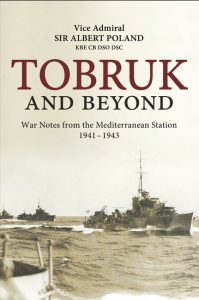- Author
- Book reviewer
- Subjects
- History - WW2, Book reviews, Royal Navy, Naval Engagements, Operations and Capabilities
- Tags
-
- RAN Ships
- None noted.
- Publication
- September 2018 edition of the Naval Historical Review (all rights reserved)
By Albert Lawrence Poland, Published by Halstead Press, Canberra, 2018. Hard cover, 176 pp with b&w illustrations, maps and portraits. Available from booksellers at about $33.00.

Peter Poland, the editor of this intriguing story, relies upon the notebooks and naval messages kept by his father, Albert Lawrence Poland, during his service in WWII between April 1941 and January 1943 when serving as the Senior Naval Officer Inshore Squadron (SNOIS) and subsequently as Captain (D) of the 14th Destroyer Flotilla. Given the war-torn nature of the operation to which this information refers, it is miraculous that it has survived.
Captain Albert Poland had travelled around the Cape to take command of the cruiser HMS Liverpool, but it was extensively damaged before he could join her and he had to be found another job. The C-in-C Mediterranean Fleet, the formidable Admiral Sir Andrew Cunningham, knew Poland from destroyer service in the 1930s, and found him a new appointment as SNOIS in charge of an assortment of ships and small craft keeping the Army supplied at its bases along the northeast African coast, most notably Tobruk. Somethingtokeep his hand inuntil a real job turned up.
Captain Poland had no staff, no office and very little in the way of instruction, just a title, and he was on his own. Poland demonstrated his ability to quickly get to know people, assess their needs, and where he could, provide invaluable assistance. He developed and maintained good contacts across the three branches of the armed services and was well respected. Starting with nothing he achieved much with the aid of such resources as the Aussie ‘Scrap Iron Flotilla’ that helped the ‘Rats of Tobruk’ in getting the job done.
This is not a volume for the faint-hearted. Reading through notes with excessive amounts of abbreviations calls for a wide understanding of military and naval terminology, although the author provides an excellent glossary. The book is divided into two parts, with the second part being easier to digest. In reading through Poland’s notes they demonstrate a disciplined mind providing a well ordered supply of facts and figures. Here is someone who, perhaps sub-consciously, knows he was part of an history-making epic.
The continuation of Captain Poland’s important wartime service is recognised by awards and elevation which is worthy of another story. He retires as Vice Admiral Sir Albert Poland, KBE, CB, DSO, DSC. The editor and his brother Patrick both served in the Royal Navy from where they retired as Commanders.
Reviewed by Arcturus




